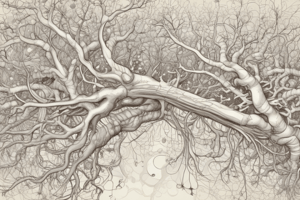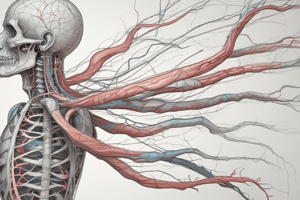Podcast
Questions and Answers
What is the main function of neurons?
What is the main function of neurons?
transmitting information
Which type of neuron has multiple dendrites and one axon?
Which type of neuron has multiple dendrites and one axon?
- Pseudounipolar
- Unipolar
- Multipolar (correct)
- Bipolar
Astrocytes play a key role in - barrier.
Astrocytes play a key role in - barrier.
blood-brain
Microglia are the largest and most numerous glial cells in the nervous system.
Microglia are the largest and most numerous glial cells in the nervous system.
Match the following neuron parts with their descriptions:
Match the following neuron parts with their descriptions:
Flashcards are hidden until you start studying
Study Notes
Nervous System Overview
- The nervous system consists of the Central Nervous System (CNS) and Peripheral Nervous System (PNS)
- The CNS includes the brain and spinal cord, while the PNS includes nerves that connect the CNS to the rest of the body
Functions of the Nervous System
- The nervous system is responsible for:
- Receiving and processing sensory information
- Controlling movements and actions
- Coordinating and integrating information
- Regulating body functions
- Enabling thought, learning, and memory
Structure of the Nervous System
- The nervous system is composed of:
- Neurons: specialized cells that transmit and process information
- Glial cells: non-neuronal cells that provide support and maintenance functions
- Nerve fibers: bundles of neuron axons
Types of Neurons
- There are three main types of neurons:
- Unipolar neurons: have one process (dendrite or axon)
- Bipolar neurons: have two processes (dendrite and axon)
- Multipolar neurons: have multiple processes (dendrites and axon)
Glial Cells
- There are four main types of glial cells:
- Astrocytes: provide nutrients and oxygen to neurons, and remove waste products
- Ependymal cells: line the ventricles and play a role in the production and circulation of cerebrospinal fluid
- Oligodendrocytes: responsible for myelination in the CNS
- Microglia: immune cells that protect the CNS from infection and disease
Functions of Glial Cells
- Glial cells play a crucial role in:
- Supporting and maintaining neurons
- Regulating the chemical environment around neurons
- Providing structural support and insulation
- Participating in the immune response
Blood-Brain Barrier
- The blood-brain barrier is a specialized barrier that separates the CNS from the bloodstream
- It is composed of:
- Endothelial cells
- Astrocytes
- Basement membrane
- The blood-brain barrier regulates the exchange of substances between the blood and the CNS
Importance of Glial Cells
- Glial cells play a vital role in maintaining the health and function of the nervous system
- They are involved in the development, maintenance, and repair of the nervous system
- Dysfunction or injury to glial cells can lead to neurological disorders and diseases
Studying That Suits You
Use AI to generate personalized quizzes and flashcards to suit your learning preferences.





